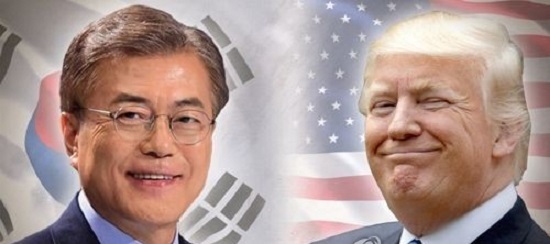Moon's N. Korea policy to be within US expectations: adviser
By a2017001Published : May 11, 2017 - 12:55
South Korean President Moon Jae-in's much-speculated engagement with North Korea will not go beyond the United States' comfort zone and consultation may precede key decisions toward Pyongyang under the new administration, a key policy adviser to Moon said Thursday.
"I will fly straight to Washington ... I will go to Beijing and Tokyo and under the right circumstances go to Pyongyang as well," Moon said in his inaugural address on Wednesday. During his campaign, the former leader of the liberal Democratic Party also pledged to engage in dialogue with Pyongyang to denuclearize, a major departure from the previous conservative government's sanctions-oriented approach. US President Donald Trump appears to prefer exerting maximum pressure on North Korea.

"With regard to inter-Korean relations, President Moon Jae-in will not have any contact with North Korea that will surprise the US," Moon Chung-in, an honorary professor at Yonsei University, told Yonhap News Agency over the phone.
The professor was a senior security advisor to former President Roh Moo-hyun, a political mentor for the new president, and was known as a key designer of former President Kim Dae-jung's engagement policy with the North. He took part in a security policy advisory group for Moon's election camp.
Prof. Moon said the president's brief reference to North Korea in his first presidential speech may indicate his willingness to handle the inter-Korean issues through collaboration with the US.
Still, the new administration is likely to embark on its own process of dialogue with North Korea in the near future in a move to study North Korea's intentions, the professor noted.
"Since (President Moon) may want to know North Korea's intention, (he) may first seek unofficial dialogue with North Korea after his spy chief nominee Suh Hoon gets parliamentary endorsement, before engaging in official dialogue and sending a special envoy (to Pyongyang)," the professor predicted.
The professor also stressed Seoul's mediating role in North Korea policies of Washington and Beijing, in order to take the "driver's seat" in the multilateral process to denuclearize the North.
The windows of cross-border exchanges and cooperation should not remain closed, he noted, saying, "Under consent from US President Donald Trump, South Korea needs to play good cop while the US plays bad cop."
He also called on the Moon government to take a realistic, step-by-step denuclearization process for North Korea. The three-stage process, the professor suggested, is comprised of the initial freeze of North Korean nuclear and missile tests, followed by verifiable dismantlement of North Korean nuclear facilities and materials and finally disposal of all nuclear weapons in the final phase.
Touching on the president's campaign pledge to review the deployment of a US missile defense system in South Korea, known as Terminal High Altitude Area Defense, the professor said the president needs to focus on studying "procedural legitimacy" of the South Korea-US negotiations leading up to the deployment. "Issues to be re-examined include whether it is useful militarily and whether Seoul would be able to meet President Trump's call to pay $1 billion in cost," he said. Still, "it is not right to say cancelling the THAAD (deployment) could constitute a collapse of the South Kore-US alliance," he added. (Yonhap)







![[Graphic News] More Koreans say they plan long-distance trips this year](http://res.heraldm.com/phpwas/restmb_idxmake.php?idx=644&simg=/content/image/2024/04/17/20240417050828_0.gif&u=)
![[KH Explains] Hyundai's full hybrid edge to pay off amid slow transition to pure EVs](http://res.heraldm.com/phpwas/restmb_idxmake.php?idx=644&simg=/content/image/2024/04/18/20240418050645_0.jpg&u=20240419100350)





![[From the Scene] Monks, Buddhists hail return of remains of Buddhas](http://res.heraldm.com/phpwas/restmb_idxmake.php?idx=652&simg=/content/image/2024/04/19/20240419050617_0.jpg&u=20240419175937)

![[KH Explains] Hyundai's full hybrid edge to pay off amid slow transition to pure EVs](http://res.heraldm.com/phpwas/restmb_idxmake.php?idx=652&simg=/content/image/2024/04/18/20240418050645_0.jpg&u=20240419100350)

![[Today’s K-pop] Illit drops debut single remix](http://res.heraldm.com/phpwas/restmb_idxmake.php?idx=642&simg=/content/image/2024/04/19/20240419050612_0.jpg&u=)